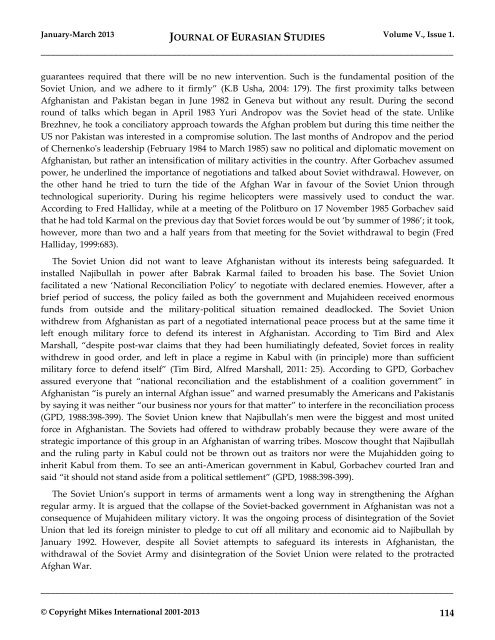JOURNAL OF EURASIAN STUDIES Journal of the Gábor Bálint de ...
JOURNAL OF EURASIAN STUDIES Journal of the Gábor Bálint de ...
JOURNAL OF EURASIAN STUDIES Journal of the Gábor Bálint de ...
You also want an ePaper? Increase the reach of your titles
YUMPU automatically turns print PDFs into web optimized ePapers that Google loves.
January-March 2013 <strong>JOURNAL</strong> <strong>OF</strong> <strong>EURASIAN</strong> <strong>STUDIES</strong> Volume V., Issue 1.<br />
_____________________________________________________________________________________<br />
guarantees required that <strong>the</strong>re will be no new intervention. Such is <strong>the</strong> fundamental position <strong>of</strong> <strong>the</strong><br />
Soviet Union, and we adhere to it firmly” (K.B Usha, 2004: 179). The first proximity talks between<br />
Afghanistan and Pakistan began in June 1982 in Geneva but without any result. During <strong>the</strong> second<br />
round <strong>of</strong> talks which began in April 1983 Yuri Andropov was <strong>the</strong> Soviet head <strong>of</strong> <strong>the</strong> state. Unlike<br />
Brezhnev, he took a conciliatory approach towards <strong>the</strong> Afghan problem but during this time nei<strong>the</strong>r <strong>the</strong><br />
US nor Pakistan was interested in a compromise solution. The last months <strong>of</strong> Andropov and <strong>the</strong> period<br />
<strong>of</strong> Chernenko's lea<strong>de</strong>rship (February 1984 to March 1985) saw no political and diplomatic movement on<br />
Afghanistan, but ra<strong>the</strong>r an intensification <strong>of</strong> military activities in <strong>the</strong> country. After Gorbachev assumed<br />
power, he un<strong>de</strong>rlined <strong>the</strong> importance <strong>of</strong> negotiations and talked about Soviet withdrawal. However, on<br />
<strong>the</strong> o<strong>the</strong>r hand he tried to turn <strong>the</strong> ti<strong>de</strong> <strong>of</strong> <strong>the</strong> Afghan War in favour <strong>of</strong> <strong>the</strong> Soviet Union through<br />
technological superiority. During his regime helicopters were massively used to conduct <strong>the</strong> war.<br />
According to Fred Halliday, while at a meeting <strong>of</strong> <strong>the</strong> Politburo on 17 November 1985 Gorbachev said<br />
that he had told Karmal on <strong>the</strong> previous day that Soviet forces would be out ‘by summer <strong>of</strong> 1986’; it took,<br />
however, more than two and a half years from that meeting for <strong>the</strong> Soviet withdrawal to begin (Fred<br />
Halliday, 1999:683).<br />
The Soviet Union did not want to leave Afghanistan without its interests being safeguar<strong>de</strong>d. It<br />
installed Najibullah in power after Babrak Karmal failed to broa<strong>de</strong>n his base. The Soviet Union<br />
facilitated a new ‘National Reconciliation Policy’ to negotiate with <strong>de</strong>clared enemies. However, after a<br />
brief period <strong>of</strong> success, <strong>the</strong> policy failed as both <strong>the</strong> government and Mujahi<strong>de</strong>en received enormous<br />
funds from outsi<strong>de</strong> and <strong>the</strong> military-political situation remained <strong>de</strong>adlocked. The Soviet Union<br />
withdrew from Afghanistan as part <strong>of</strong> a negotiated international peace process but at <strong>the</strong> same time it<br />
left enough military force to <strong>de</strong>fend its interest in Afghanistan. According to Tim Bird and Alex<br />
Marshall, “<strong>de</strong>spite post-war claims that <strong>the</strong>y had been humiliatingly <strong>de</strong>feated, Soviet forces in reality<br />
withdrew in good or<strong>de</strong>r, and left in place a regime in Kabul with (in principle) more than sufficient<br />
military force to <strong>de</strong>fend itself” (Tim Bird, Alfred Marshall, 2011: 25). According to GPD, Gorbachev<br />
assured everyone that “national reconciliation and <strong>the</strong> establishment <strong>of</strong> a coalition government” in<br />
Afghanistan “is purely an internal Afghan issue” and warned presumably <strong>the</strong> Americans and Pakistanis<br />
by saying it was nei<strong>the</strong>r “our business nor yours for that matter” to interfere in <strong>the</strong> reconciliation process<br />
(GPD, 1988:398-399). The Soviet Union knew that Najibullah’s men were <strong>the</strong> biggest and most united<br />
force in Afghanistan. The Soviets had <strong>of</strong>fered to withdraw probably because <strong>the</strong>y were aware <strong>of</strong> <strong>the</strong><br />
strategic importance <strong>of</strong> this group in an Afghanistan <strong>of</strong> warring tribes. Moscow thought that Najibullah<br />
and <strong>the</strong> ruling party in Kabul could not be thrown out as traitors nor were <strong>the</strong> Mujahid<strong>de</strong>n going to<br />
inherit Kabul from <strong>the</strong>m. To see an anti-American government in Kabul, Gorbachev courted Iran and<br />
said “it should not stand asi<strong>de</strong> from a political settlement” (GPD, 1988:398-399).<br />
The Soviet Union’s support in terms <strong>of</strong> armaments went a long way in streng<strong>the</strong>ning <strong>the</strong> Afghan<br />
regular army. It is argued that <strong>the</strong> collapse <strong>of</strong> <strong>the</strong> Soviet-backed government in Afghanistan was not a<br />
consequence <strong>of</strong> Mujahi<strong>de</strong>en military victory. It was <strong>the</strong> ongoing process <strong>of</strong> disintegration <strong>of</strong> <strong>the</strong> Soviet<br />
Union that led its foreign minister to pledge to cut <strong>of</strong>f all military and economic aid to Najibullah by<br />
January 1992. However, <strong>de</strong>spite all Soviet attempts to safeguard its interests in Afghanistan, <strong>the</strong><br />
withdrawal <strong>of</strong> <strong>the</strong> Soviet Army and disintegration <strong>of</strong> <strong>the</strong> Soviet Union were related to <strong>the</strong> protracted<br />
Afghan War.<br />
_____________________________________________________________________________________<br />
© Copyright Mikes International 2001-2013 114

















